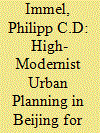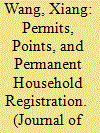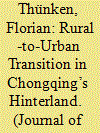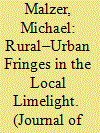| Srl | Item |
| 1 |
ID:
178303


|
|
|
|
|
| Summary/Abstract |
China’s urbanisation drive has been unprecedented in scale. It has also produced some paradoxical outcomes and led to multiple interconnections between the rural and the urban spheres. These interconnections are the central focus of this special issue. Thus, preference is given to the term “rural–urban transformation” instead of simply “urbanisation.” The main argument advanced here is that we always need to consider the rural aspects and repercussions alongside the urban side of this dual process. This introduction first highlights some of these antinomies to set the stage for the discussion. Next, it explains how they relate to changing mechanisms of inclusion/exclusion. It is proposed that a theoretical approach of functional differentiation can help us sort out the various ways inclusions and exclusions are being produced and combined. Finally, the introduction presents an overview of the articles collected in this special issue and how they relate to the aforementioned topics.
|
|
|
|
|
|
|
|
|
|
|
|
|
|
|
|
| 2 |
ID:
178306


|
|
|
|
|
| Summary/Abstract |
This article analyses the implementation process of Beijing’s current urban master plan using the background of modernisation theory. The line of thought behind the new urban master plan follows a high-modernist ideology embedded in an environment of reflexive modernity. Intermediate goals of the urban master plan are to tighten population control and increase social legibility of the city, providing an additional explanation for state-led urbanisation besides economic reasons. Urban planning is thus used as a social control mechanism and has emerged as a new means to maintain social distinction, creating new forms of exclusion. It can be observed that disruptive Mao era style pushes are still being employed in the policy cycle even today. This becomes evident from the implementation style of urban planning, where campaign-style and regularised implementation methods are complementing each other. This is corroborated through documentary analysis, interviews, and fieldwork conducted by the author.
|
|
|
|
|
|
|
|
|
|
|
|
|
|
|
|
| 3 |
ID:
178309


|
|
|
|
|
| Summary/Abstract |
In the course of state-led rural urbanisation over the past few decades, millions of Chinese peasants have been expropriated and relocated. After establishing a definition of these “landless peasants” as a heterogeneous social group connected mainly by the fact that its members had to give up their land-use rights, this article sets out to examine subsequent processes of identity formation – a topic that has been largely neglected in existing research. Drawing on Beck’s individualisation thesis, I suggest that structural and institutional changes in the process of rural modernisation have initiated a further thrust of individualisation in people’s lives which manifests not only in the objective domain of life situations but also in the subjective domain of identity. This hypothesis is substantiated through an ethnographic case study based on seven months of fieldwork (2016–2018) in Huaming Model Town in the Dongli District of Tianjin. As a first step towards conceptualising what landless peasants are becoming, I will propose to start focusing on recombinant identities and class differentiations evolving among the people.
|
|
|
|
|
|
|
|
|
|
|
|
|
|
|
|
| 4 |
ID:
178305


|
|
|
|
|
| Summary/Abstract |
China’s New-type Urbanisation Plan heralded a new phase of reform of the household registration (hukou) system and initiated a nation-wide reconfiguration of hukou policy in Chinese cities. This study reveals that the former localisation of hukou policymaking has been brought to greater uniformity under the current central guidelines. The liberalisation of hukou conversion has been expanded to many large cities that previously employed selective migrant integration policies. Mega-cities have recalibrated the selection criteria for new citizens, elevating the importance of settlement duration and moderating the importance of educational and professional qualifications. Case studies in Guangdong further reveal the dynamic interactions among different levels of government in the course of reform. Local policy experimentations set important precedents for central policymaking, and the central guidelines are enforcing new adjustments in local implementation. The provincial government plays a prominent role in coordinating top-down directives and local conditions.
|
|
|
|
|
|
|
|
|
|
|
|
|
|
|
|
| 5 |
ID:
178307


|
|
|
|
|
| Summary/Abstract |
Since 2014 the Chinese state has been pushing for “new-style urbanisation.” Its main goals are accelerated urban–rural integration, development of small-to-medium cities and towns, and a “people-centered” urbanisation, all while limiting movement towards big cities. Similar reforms have been experimented with in Chongqing since 2007. This article argues that we need to take both top-down and bottom-up processes into view if we are to understand completely the intricate transformation currently underway in China’s urbanising society. Thus, policies and programmes at the national and provincial level are examined and then contrasted with findings from field research, that has been conducted in Chongqing’s urbanising hinterland. Findings show patterns of rural-to-urban transitioning which apparently match the central and municipal governments’ plans, but further evidence points to the rejection or modification of state-led urbanisation efforts and towards an urbanisation on the people’s own terms.
|
|
|
|
|
|
|
|
|
|
|
|
|
|
|
|
| 6 |
ID:
178310


|
|
|
|
|
| Summary/Abstract |
As urbanisation strategies have been adopted throughout China in recent years, it has become increasingly relevant to study their implementation processes in so-called lower-tier cities away from the well-known regions. Urbanisation has given rise to different types of settlements for landless peasants: planned resettlement neighbourhoods, as well as more or less accidentally grown urban villages. While resettlement is widely adopted and positively propagated, urban villages are usually only seen as soon-to-be demolished “non-places” and their residents are often stigmatised. This article focuses on a case in Yinchuan, the capital of Ningxia Hui autonomous region. It analyses the demolition process of Yingnan village and its lead-up and finds that despite this general discursive framework, exposure on a local TV show and low scores on a national “civilised cities” ranking pressured the local government to not ignore Yingnan village as merely a “non-place” but to invest in better sanitary conditions and speed up redevelopment.
|
|
|
|
|
|
|
|
|
|
|
|
|
|
|
|